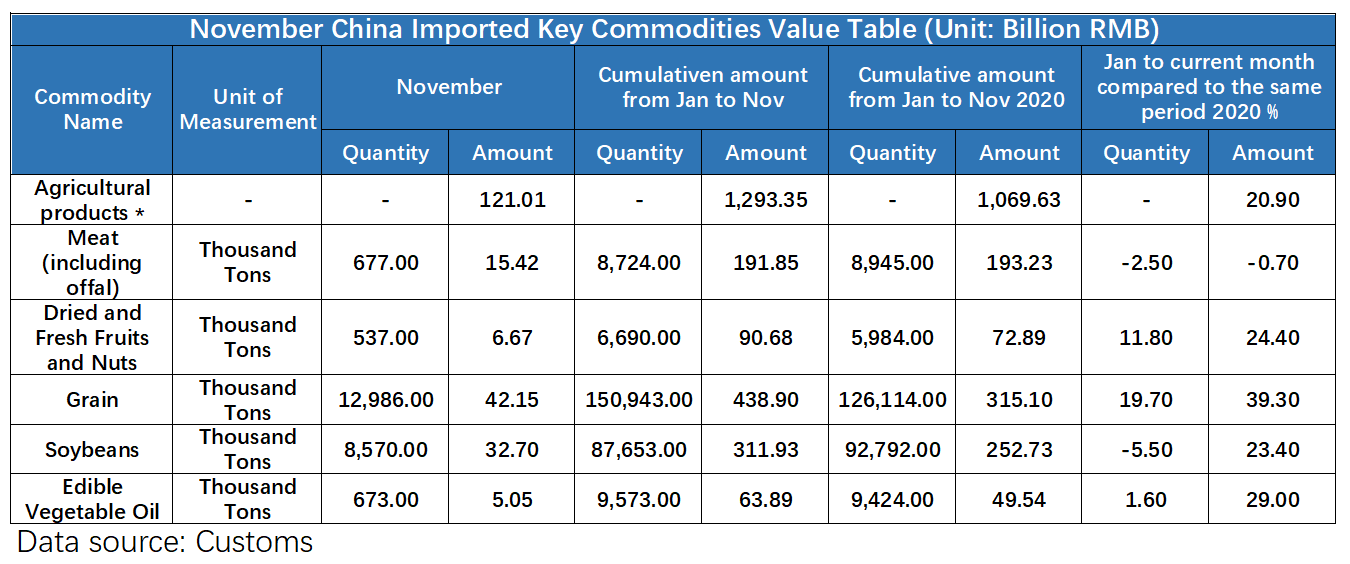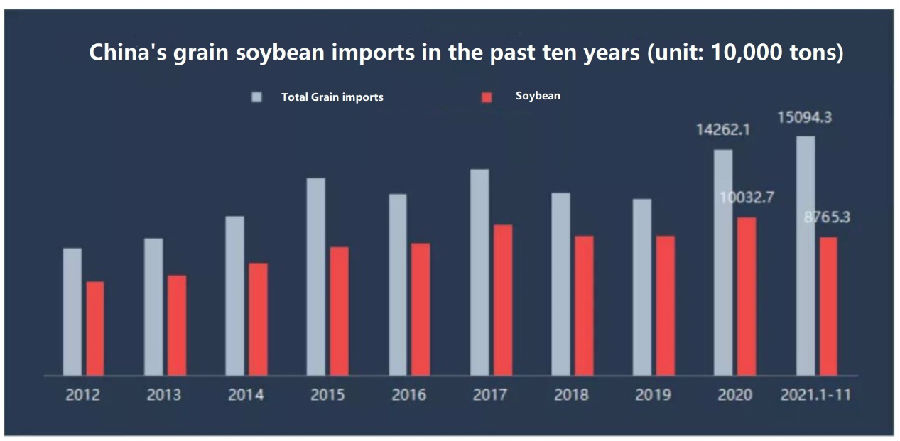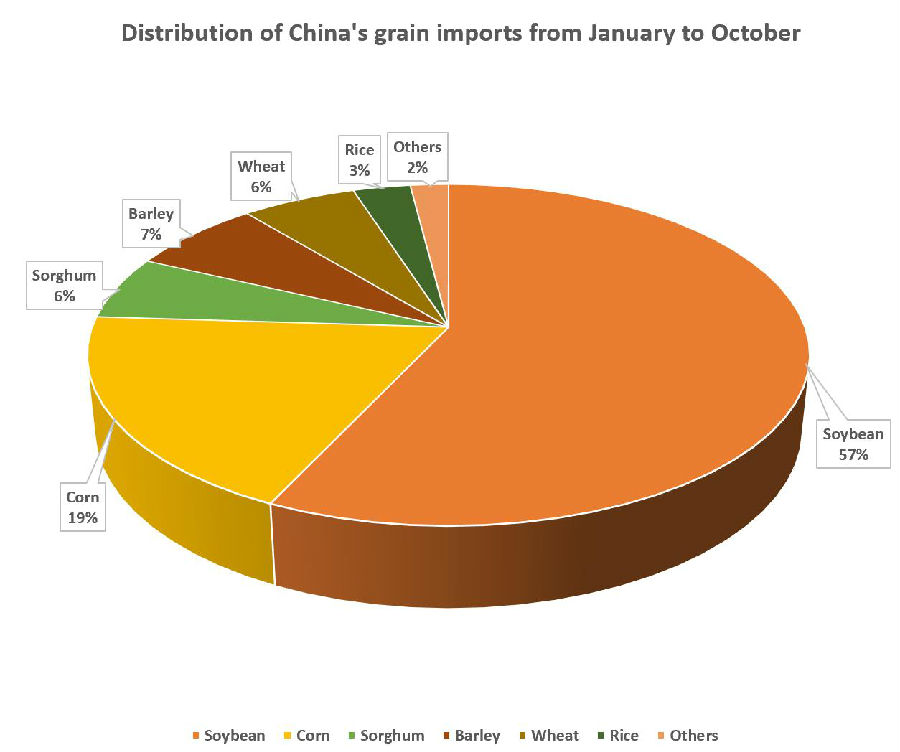———— Time:2021-12-09 Edit: Number of times read:55 ————
On December 7, the General Administrationof Customs announced the latest data. In November, China imported 12.986million tons of grain, and the total imported grain from January to Novemberwas 15.094 million tons, an increase of 20% over the same period last year,which greatly exceeded the total grain imports of last year by 142.621 milliontons, accounting for more than one-fifth of China’s total grain output of682.85 million tons.

Among them, 8.57 million tons of soybeanswere imported in November, a sharp increase of 68% from October (5.11 milliontons). The cumulative imports from January to November were 87.653 milliontons, a year-on-year increase of 23.4%; in November, 673,000 tons of vegetableoil were imported, and the cumulative imports from January to November were9.573 million tons, a year-on-year increase of 1.6%.

Grain imports exceeded 150 million tons,exceeding last year's total imports.
This year, China's grain output and importshave shown a situation of "increasing".
On November 6, the National Bureau ofStatistics announced good news that China’s total grain output reached a newhigh, reaching 1365.7 billion catties.
On November 7, the General Administrationof Customs announced the latest data. From January to November, China's grainimports were 150.943 million tons, an increase of 20% year-on-year, andexceeded the total grain imports of 8.322 million tons last year.
From the perspective of the importstructure (take the import data from January to October as an example), soybeanimports are still dominated by 79.08 million tons, accounting for 57% of thetotal imports. Corn imports have grown prominently, accounting for 19% of thetotal. Corn imports accounted for only 7.9% of total food last year. Theincrease in grain imports is mainly due to the structural shortage of grain.This year, the release of hog production capacity has accelerated, and thedemand for feed is strong. Most of the imported grain is used as feed.

In China, soybeans are highly dependent onimports. Corn and wheat are subject to import quota management. Import tariffswithin quotas are lower, and additional import tariffs are higher, whicheffectively protects the domestic market. Barley and sorghum are not protectedby tariffs, but they account for a relatively small share of the total grainimports and have minimal impact on the domestic market.
The increase in the scale of grainimports means that there is a problem with food security?
China is a large grain consuming country. Alarge amount of grain imports is of positive significance for ensuring a stabledomestic grain supply and is one of the important ways to solve China's foodsecurity problems.
At present, China has a bumper harvestevery year, with sufficient stocks, and the self-sufficiency rate of grainsexceeds 95%. In particular, the self-sufficiency rate of the two major rationsof rice and wheat exceeds 100%. In order not to squeeze the domestic staple grainplanting space and meet the demand for feed, China needs to adjust the surplusand shortage through imports, optimize the supply structure, and improve theoverall level of national food security from a higher level.
Moreover, China has not completely placedits food security on its food trade. Insist on making good use of bothinternational and domestic markets and resources, ensuring domestic foodproduction capacity, promoting diversification of grain imports, notover-relying on grain imports, reducing food security risks, and firmlygrasping the initiative in food security.
Make full use of grain imports to ensurenational food security.
According to the Economic Daily, thecurrent COVID-19 is still fluctuating around the world, and the upward pressureon commodity prices is being transmitted. It is necessary to guard against theimported risks of rising international food prices. In this context, Chinafirmly grasps the stability and initiative of food imports, which is of great significanceto ensuring food security.
The epidemic has caused an imbalancebetween global food supply and demand. Although global grain production hasincreased this year, demand has increased even more, and the supply-demandrelationship has shown a steady and tighter trend. Although grain imports haveincreased this year, the global grain trade volume is ultimately limited.
Zhong Yu, director of Industrial EconomicResearch Office of the Institute of Agricultural Economics and Development of Academyof Agricultural Sciences, believes that China should make more effective use ofthe international market, make up for the domestic surplus through imports, andsolve the structural shortage of domestic grain. However, it must also fullyconsider the world's grain supply capacity, maintain a relatively stable importscale, and avoid sudden large-scale imports that affect food security.
Tu Shengwei, director of the Rural EconomicResearch Office of the Institute of Industrial Economics and TechnologicalEconomics of National Development and Reform Commission, believes that Chinamust continue to increase grain production, increase grain storage capacity,and ensure "basically self-sufficiency in grains and absolute security of foods."China must firmly hold the initiative in food security in order to grasp thestability and initiative in imports and resist the risk of imported inflationbrought about by rising international food prices.